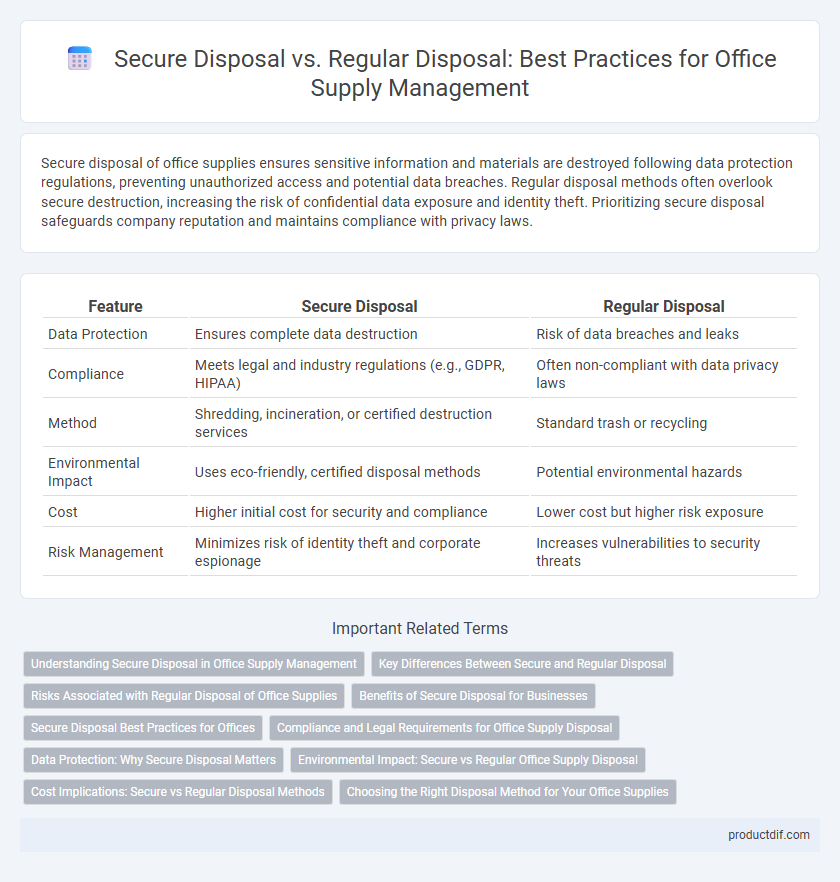Secure disposal of office supplies ensures sensitive information and materials are destroyed following data protection regulations, preventing unauthorized access and potential data breaches. Regular disposal methods often overlook secure destruction, increasing the risk of confidential data exposure and identity theft. Prioritizing secure disposal safeguards company reputation and maintains compliance with privacy laws.
Table of Comparison
| Feature | Secure Disposal | Regular Disposal |
|---|---|---|
| Data Protection | Ensures complete data destruction | Risk of data breaches and leaks |
| Compliance | Meets legal and industry regulations (e.g., GDPR, HIPAA) | Often non-compliant with data privacy laws |
| Method | Shredding, incineration, or certified destruction services | Standard trash or recycling |
| Environmental Impact | Uses eco-friendly, certified disposal methods | Potential environmental hazards |
| Cost | Higher initial cost for security and compliance | Lower cost but higher risk exposure |
| Risk Management | Minimizes risk of identity theft and corporate espionage | Increases vulnerabilities to security threats |
Understanding Secure Disposal in Office Supply Management
Secure disposal in office supply management ensures confidential documents and sensitive materials are destroyed to prevent data breaches. It involves shredding, incineration, or using certified disposal services that comply with data protection regulations like GDPR and HIPAA. Regular disposal lacks these safeguards, increasing the risk of information theft and regulatory penalties.
Key Differences Between Secure and Regular Disposal
Secure disposal ensures confidential documents and sensitive office materials are destroyed using shredding or incineration to prevent data breaches, while regular disposal typically involves standard trash removal without protection against information theft. Secure disposal complies with regulatory standards such as HIPAA and GDPR, providing legal protection for businesses handling personal or proprietary information. Regular disposal risks exposure of confidential data due to lack of encryption or destruction protocols, making it unsuitable for sensitive office waste.
Risks Associated with Regular Disposal of Office Supplies
Regular disposal of office supplies poses significant risks including data breaches from improperly discarded electronics containing sensitive information, environmental hazards due to non-recyclable waste, and legal liabilities linked to the mishandling of confidential materials. Inadequate disposal methods increase the likelihood of identity theft and compromise corporate compliance with data protection regulations. Secure disposal protocols mitigate these threats by ensuring sensitive documents and electronic devices are destroyed or recycled responsibly, safeguarding both the company and the environment.
Benefits of Secure Disposal for Businesses
Secure disposal protects sensitive business information by preventing data breaches and identity theft, reducing legal and financial risks associated with improper waste handling. It ensures compliance with data protection regulations such as GDPR and HIPAA, safeguarding company reputation and customer trust. Using certified secure disposal services minimizes liability and enhances overall operational security for businesses.
Secure Disposal Best Practices for Offices
Secure disposal in offices involves shredding sensitive documents, using locked bins, and partnering with certified destruction services to prevent data breaches. Regular disposal methods risk exposing confidential information and can lead to compliance violations under regulations such as GDPR and HIPAA. Implementing secure disposal best practices safeguards employee privacy, protects company intellectual property, and maintains regulatory compliance.
Compliance and Legal Requirements for Office Supply Disposal
Secure disposal of office supplies ensures compliance with data protection laws such as GDPR and HIPAA, preventing unauthorized access to sensitive information. Regular disposal methods often fail to meet these legal requirements, increasing the risk of data breaches and potential fines. Implementing certified destruction services guarantees adherence to industry regulations and protects corporate confidentiality.
Data Protection: Why Secure Disposal Matters
Secure disposal ensures that sensitive office documents and electronic media are destroyed in a way that prevents data recovery, protecting confidential business information from identity theft and corporate espionage. Regular disposal methods often leave data vulnerable to extraction through dumpster diving or improper handling, increasing the risk of data breaches and legal liabilities. Implementing secure disposal protocols like shredding, degaussing, or certified destruction services is essential to maintain compliance with data protection regulations such as GDPR and HIPAA.
Environmental Impact: Secure vs Regular Office Supply Disposal
Secure disposal of office supplies prevents hazardous materials like toner cartridges and batteries from contaminating soil and water, reducing environmental pollution. Regular disposal often leads to landfill accumulation, contributing to toxic waste and increased carbon emissions. Choosing secure disposal practices supports recycling efforts and minimizes the ecological footprint of office waste.
Cost Implications: Secure vs Regular Disposal Methods
Secure disposal methods for office supplies often involve higher upfront costs due to specialized shredding, secure transport, and compliance with data protection regulations, compared to regular disposal. However, regular disposal methods risk data breaches and potential legal penalties, which can result in significantly higher long-term expenses. Investing in secure disposal reduces financial risks associated with sensitive information leaks and ensures adherence to industry standards.
Choosing the Right Disposal Method for Your Office Supplies
Choosing the right disposal method for office supplies hinges on the sensitivity of materials and environmental impact considerations. Secure disposal ensures confidential documents and electronic waste are destroyed and recycled safely, preventing data breaches and complying with privacy regulations. Regular disposal may be sufficient for non-sensitive items but often lacks the safeguards and ecological benefits that secure disposal provides.
Secure disposal vs Regular disposal Infographic

 productdif.com
productdif.com